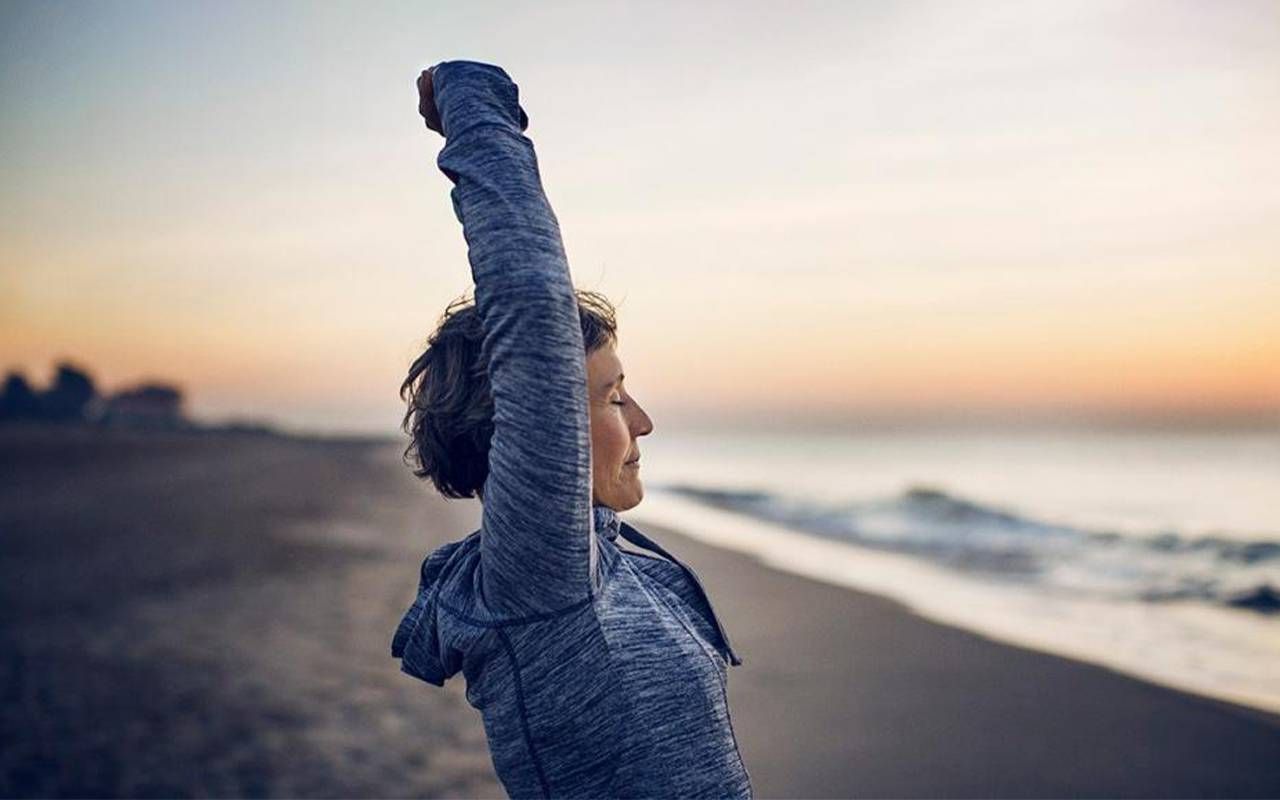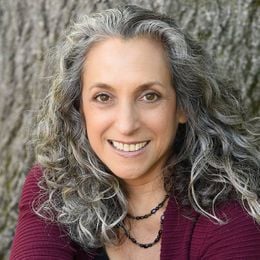As You Age, Meet Yourself Where You Are
Think of aging as the 'other (third) trimester' with a different type of anticipation
It was dark and cold as I drove over the hill, my son in the passenger seat beside me. At the stop sign, I reached to raise the temperature dial, my hand moving into the green glow of the dashboard light. Suddenly I noticed the strange, serpentine scales: the back of my hand, aging before my eyes.

"Do you see that?" My midlife panic rose up before I could tamp it down.
"What's wrong with your hand?" my son gasped. "It's like a time warp — like what it'll look like when you're really old."
Really old … It's a concept that, increasingly, doesn't feel so far away.
Coming to terms with aging is like wrestling a bear. You know you cannot win, no matter your skills or precautions. In the early years, there are moments of triumph when someone assumes that you're younger than you are, followed by gradually more frequent moments of denial: "I still look good," segueing slowly into self-flagellation: "Stop fooling yourself," until, finally, those rare moments of graceful acceptance. I'm still waiting.
Coming to terms with aging is like wrestling a bear. You know you cannot win, no matter your skills or precautions.
I want to say that it first hit me last autumn after our youngest son went off to college. In fact, it's been creeping up on me for a while. When my husband was switching jobs, I nagged him to stop using his AOL email. "Honey, you're just screaming to everyone that you're old."
Then there was the happy email from a cousin who had just become a grandmother. I wrote to her cheerily, "How did this happen?" to which she replied, with not a little snark, "I'm over sixty. Don't you think it's about time?"
Perhaps it is easier for me to maintain my denial because I had children quite late. Most of the parents at our sons' college drop-offs were at least a decade younger than my husband and me. It was easy to pretend we fit in. We just kept quiet when one dad joked about his upcoming "big birthday," exchanging glances when he added "5-0."
And throughout the weekend, I proudly flaunted my curly, post-COVID gray mane as a fashion statement until one mother whispered, "You'd look ten years younger if you dyed it."
My sister recently called this period our "third trimester," reminding me of when we were both pregnant at the same time years ago. Back then, we were looking ahead to a new phase of life, one that admittedly felt more exciting and hopeful than the one we're both looking toward now.
Back then, we were looking ahead to a new phase of life, one that admittedly felt more exciting and hopeful than the one we're both looking toward now.
Changes in Flexibility
Over the years, I've padded my denial further by keeping in shape. I do yoga and hike several times a week. But recently, even that dedication has been thwarted. Arthritis has kicked in. No surprise, given how I used to punish my body. Once, long ago, I was a professional dancer. Back then, I was more than lean, flexible, and strong: I could do quadruple pirouettes, or slide into 200-degree splits simply by leaning my leg against the wall. Now I struggle to touch my head to both knees. (I can still touch one at a time.)
My instructor says to "meet yourself where you are" and suggests adjustments that I'm ridiculously reluctant to make. Meanwhile an old dancer friend answers my frustration with pragmatism: "Do you really need to do that anymore?"
And that is the question: do I? I haven't been a dancer in decades. I'm a writer. Being healthy and fit is actually impressive, given that I sit at my desk most of the day.
As I gaze in the mirror, my middle-aged lumpiness feels unconscionable, but my sons assure me that "It would be weird if you looked like you did back then!" They're not just being kind. They mean that this shape is what makes me look like their mother. I should treasure their sentiment.
So why, when I scroll through Instagram, am I stunned by posts of another dancer friend? She's just a few years younger but runs a Pilates studio in Los Angeles. She looks absolutely fabulous — because, I rationalize, squashing the old envy, looking amazing is her job.
Other friends are aging at a more graceful pace, and more open about accepting themselves as they are — or, rather, aren't. Then there are those long-lost friends I dig up on Facebook. Many of them look like grandparents … because they are.
Slow Shifts of Perspective
Worse than all these changes are the slow shifts of perspective that come with what aging implies. These days I count backward to the major landmarks in my life. The boys were born twenty years ago. Where will I be twenty years from today? I hear my mother, still spritely in her eighties: "I know I'm not, but why do I still feel nineteen?"
I know a beautiful young woman who suffered and survived a series of debilitating health crises. She tells me that she looks forward to getting fat and old. She embraces the inevitable because, for her, it was not. Simply surviving is the triumph. While for me, who has escaped serious health challenges so far, the sour grapes of minor hip pain and slightly tightening pants feel like major blows.
Philosophy doesn't placate the spirit that refuses to grow old. Perhaps that's why infirmity happens. At some point the body insists on what the mind refuses to accept.
It's easy to imagine that we can repel aging for a while. That night of the serpentine scales on my hand, I went home and hit the hand cream hard. But it won't go on forever. It shouldn't and can't. Imagine a world where no one dies…. We're not talking science fiction any longer. The clock is quite literally ticking; population is out of control. We reached eight billion humans just last November. I remember when I was just a girl hearing the staggering news that we had hit half that mark. The climate change disasters that fill our newsfeeds are evidence of the planet's distress. What happens when we have mass migration, food shortages and more?
Not to mention the challenges of caring for the aging. Anyone who has an older parent will tell you that our systems are inadequate to the task. Longing for immortality is selfish, short-sighted, even self-destructive. And yet, who doesn't look toward THE END and beg for more?
But philosophy doesn't placate the spirit that refuses to grow old. Perhaps that's why infirmity happens. At some point the body insists on what the mind refuses to accept. If we're lucky enough to be alive to experience it, perhaps we should do it with gratitude and grace.
So as I ease into the adjustments that aging requires, I remember the comment I make at every birthday — mine or my sister's or a friend's — "It's better than the alternative." Another day, another ache, another pound, another step from what was to what is to come … Maybe being older isn't so bad.

Read More

